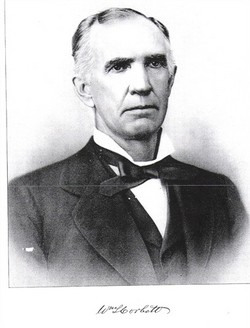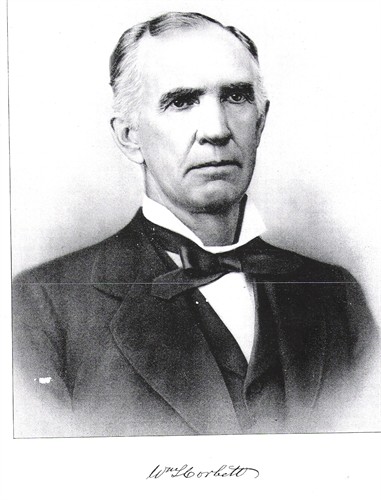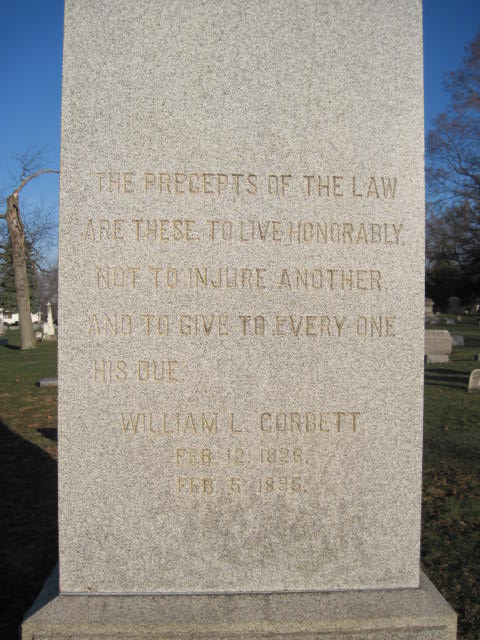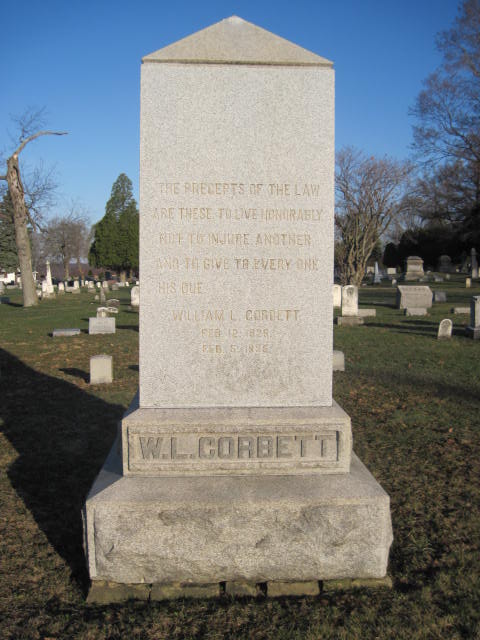HON. WILLIAM L. CORBETT, generally known as Judge Corbett in the neighborhood in which he resided, born on the 12th day of February. A. D. 1826, in Clarion township, Clarion Co., Penn.
The home of his parents, Isaac and Margaret Corbett, stood on tbe side of the old Susquehanna and Waterford turnpike, about a mile east of Clarion borough.
He received his middle name, Lucas, after the family of his mother. His ancestors were among the original settlers of Clarion county, and had been united by the marriage of his grandfather, William Corbett, with the Clovers, a family equally as large.
The grandparents, William and Sarah Corbett, were the progenitors of that very large connection at present residing in northwestern Pennsylvania.
At the early age of fourteen years William lost his father, and being the only child was left the sole support of his widowed mother. She and her son had been left a farm of considerable size, and as was frequently the case in that day it was accompanied by a scarcity of money. This resulted in many a sacrifice and denial, and furnished Judge Corbett that early training which was the common inheritance of men of his time.
His boyhood was mostly consumed by assisting in the management of the farm and in attendance on the neighborhood schools. As soon as the Clarion Academy was erected and opened, on the site of the present public-school building in Clarion borough, William was entered as a pupil, and attended its sessions until he was about eighteen years of age.
When Clarion was located as the county seat of the new county, then created and named Clarion county, and the ground was broken for its first public buildings in 1840, William was residing with his mother in the old homestead. His education was finished with his course at the Academy.
The earliest recollections of Judge Corbett, by those who knew him, show him to have been a taciturn, thoughtful boy. Thrown at a very early period on his own resources, life of seemed made up of the sternest realities in itself, a hard but earnest struggle. And to these an early experiences is to be attributed the development of that spirit of independence, indomitable courage and unswerving loyalty to the principles of right and truth which characterized his entire life.
In comparison with the advantages of the schools of to-day one must recognize that Judge Corbett's education up to this point was very limited. Undoubtedly as a boy and young man, his attention was attracted to the legal controversies of the county seat, for in that early day great interest was manifested in the legal battles of the courts, and the respective abilities of the different attorneys by the people of the surrounding country.
In the eighteenth year of his age WiIliam registered as a law student in the office of D. W. Foster, an attorney of Clarion, and as a student read in this gentleman's office. One of his associates has said "his mind ran so strong in the direction of his legal studies that it was not very long until he knew more law than his preceptor did; and such was his proficiency that an exception was made in his favor, the rules of court were susperided so that he could be, as he was, admitted to the Bar before he was of full age." This was February 2, 1847.
He was a close student, and in the early days of his student life, and even up to the time he was forty years old, he poured over the text books of the masters of the law into the morning hours.
As a young man this close application was varied with an occasional trip down the Clarion river on a metal boat, to obtain money with which to buy books.
Before he was at the bar two years, he was appointed deputy attorney-general for Clarion county, and served in that capacity until the fall of 1850.
By study and close attention to business, he soon acquired a reputation and a good practice at the bar. The law as a profession he regarded as a highly honorable and responsible one, and in it he took a just pride.
It is unmistakable that Judge Corbett was born to be a lawyer. He acquired a mastery of legal science so rapidly and so thoroughly, that in a very short time, for a young man, he rose to the very front rank in the profession. His peculiar physical appearance made him well known to everyone in Clarion county.
Everyone that ever attended court, and caught sight of him once, would ever know him. Massive, rugged and robust, in motion slow, in speech sonorous and delibrate, grave in aspect, serious in demeanor, of antique and heroic mold, he, in heated debate, seemed the incarnation of force and energy and power.
In trial of cases in court, he was a leader in Clarion and adjoining counties for many years. For forty years he occupied the position as the leading trial lawyer in cases before those courts. He was uniformly and thoroughly a lawyer. Everything that came under his observation was considered and treated in a lawyer like manner. If it was making an improvement, erecting a house, or making preparations for an outing to hunt or fish, every need and want was considered and provided for in the most practical way. Preparation was the secret of Judge Corbetts success.
There were few questions that he read or heard inquired of relating to his profession that did not receive immediate deliberation and examination. Very frequently what was considered general knowledge with him, was the result of study in anticipation of being called upon for an expression of his opinion.
In the trial of cases Judge Corbett gave himself up more completely to this principle of life. From his introduction into a case he commenced a critical analysis of it in all its phases. A page was immediately set apart in his brief book, and when the day of trial came there was a record of the points likely to arise, and the authorities relating to the same.
In his advice to one younger at the Bar who expressed regret of the manner a trial of a case embarassed him, he said that the best cure for nervousness under such circumstances was thorough preparation.
Judge Corbett in early life was a Whig in politics, but in 1854 he attached himself to the Democratic party, and on several occasions was chosen delegate to county and State conventions.
In 1868 he was a delegate to the Democratic National Convention that nominated Horatio Seymour for President.
In 1872 he was elected delegate-at-large to the State Constitutional Convention, and served on its most important committees. In this distinguished body he met the leading lawyers and public men of that period in Pennsylvania, and his ability and character became known throughout the State. and the friendships formed with its leaders were cherished throughout life.
In 1876 he was elected a member of the State Senate of Pennsylvania, and served two years. Here his ability as a lawyer was at once recognized, and he was assigned to the most responsible committees. This term in the Senate was characterized by a spirited discussion on anti-discrimination and pipe-line bills, Judge Corbett, while representing a district the heart of the oil territory of the State, was expected to take an active part in supporting measures before the Legislature on these subJects. This he did as to the pipeine bill, he refused to speak on behalf of the anti-discrimination bill, as he believed, as drawn, it was unconstitutional, and the history of subsequent legislation on this subject in Congress supported the view taken by Judge Corbett at that time.
His refusal to act in opposition to his convictions to please a few was used against him, and his service in the Senate was limited to one term.
In January, 1885, he was appointed president judge of the Eighteenth Judicial District, by GOV. Pattison, to fill the vacancy caused by the death of Hon. James G. Knox, and served during that year. He brought to the discharge of the duties of that office the same ability and integrity that characterized all his actions through life.
One of the most important cases that came up before him remains in the reports as a monument of his legal ability. In the case of Commonwealth ex.rel. The Attorney General 'vs. the N. Y..L. E. & W. R. R. Co., 114 Penn. 340, the State sought to escheat the lands of the defendant company. Eminent counsel appeared on both sides of the case. After hearing the argument Judge Corbett took the case from the jury. An appeal was taken, and the supreme court reversed the ruling of the lower court. Two years afterward, in Commonwealth vs. N. Y., L. E. & Y. R. R. Co. et al., 132 Penn. 591, the same question came before the higher court, and after a reargument the court reversed its former ruling. The supreme court then ordered a re-argument in the first case, and in Commonwealth vs. Railroad Co., 139 Penn. 457, reversed their former ruling and adopted the view taken of the case by Judge Corbett.
Judge Corbett's love for dumb animals was particularly noticeable to those who knew him. Very frequently in passing from the court house to his office would he speak to a dog, or to a horse tied to a hitching post. So familiar was he with these fellow creatures that a delivery horse of a neighboring grocery store would prick up his ears whenever the Judge came in sight.
Most of the children of Clarion knew him; and it was unusual for him to pass a small child without noticing it.
In his profession he was especially spoken of for his kindness to his fellow members of the Bar, and particularly to beginners, in always having time to talk with them over hard points in their practice.
On January 22, 1895, Judge Corbett tried a case in the common pleas of Clarion county, in which he made a long and exhaustive argument. He retired that night in very good spirits, expecting to commence another case the following morning.
About dawn of the next day he was stricken with paralysis. Then followed fifteen days during which part of the time he was conscious; at other times in his delirium he was trying again the legal battles of his past life, asking the court or the jury, in the name of justice, to remember the favorable points of his client's cause; and to overlook wherein he had failed.
Pleading, as he was wont to do, for the supremacy of mercy, justice and truth, the strong and noble spirit of 'William L. Corbett passed into the presence of his Creator, seeking" no reward but the crown for duty done."
We cannot close this short sketch of such a character in a more fitting manner than to quote the resolution of the Bar of Jefferson county:
"That of him we can truthfully say, that he was an honest man, a law-abiding man; that he proved himself in the several courts to be an attorney of sound learning and ability, faithful alike to the court and to his client, that he used no falsehood, and never retarded the administration of justice for either lucre, malice, or to obtain an unfair advantage."
HON. WILLIAM L. CORBETT, generally known as Judge Corbett in the neighborhood in which he resided, born on the 12th day of February. A. D. 1826, in Clarion township, Clarion Co., Penn.
The home of his parents, Isaac and Margaret Corbett, stood on tbe side of the old Susquehanna and Waterford turnpike, about a mile east of Clarion borough.
He received his middle name, Lucas, after the family of his mother. His ancestors were among the original settlers of Clarion county, and had been united by the marriage of his grandfather, William Corbett, with the Clovers, a family equally as large.
The grandparents, William and Sarah Corbett, were the progenitors of that very large connection at present residing in northwestern Pennsylvania.
At the early age of fourteen years William lost his father, and being the only child was left the sole support of his widowed mother. She and her son had been left a farm of considerable size, and as was frequently the case in that day it was accompanied by a scarcity of money. This resulted in many a sacrifice and denial, and furnished Judge Corbett that early training which was the common inheritance of men of his time.
His boyhood was mostly consumed by assisting in the management of the farm and in attendance on the neighborhood schools. As soon as the Clarion Academy was erected and opened, on the site of the present public-school building in Clarion borough, William was entered as a pupil, and attended its sessions until he was about eighteen years of age.
When Clarion was located as the county seat of the new county, then created and named Clarion county, and the ground was broken for its first public buildings in 1840, William was residing with his mother in the old homestead. His education was finished with his course at the Academy.
The earliest recollections of Judge Corbett, by those who knew him, show him to have been a taciturn, thoughtful boy. Thrown at a very early period on his own resources, life of seemed made up of the sternest realities in itself, a hard but earnest struggle. And to these an early experiences is to be attributed the development of that spirit of independence, indomitable courage and unswerving loyalty to the principles of right and truth which characterized his entire life.
In comparison with the advantages of the schools of to-day one must recognize that Judge Corbett's education up to this point was very limited. Undoubtedly as a boy and young man, his attention was attracted to the legal controversies of the county seat, for in that early day great interest was manifested in the legal battles of the courts, and the respective abilities of the different attorneys by the people of the surrounding country.
In the eighteenth year of his age WiIliam registered as a law student in the office of D. W. Foster, an attorney of Clarion, and as a student read in this gentleman's office. One of his associates has said "his mind ran so strong in the direction of his legal studies that it was not very long until he knew more law than his preceptor did; and such was his proficiency that an exception was made in his favor, the rules of court were susperided so that he could be, as he was, admitted to the Bar before he was of full age." This was February 2, 1847.
He was a close student, and in the early days of his student life, and even up to the time he was forty years old, he poured over the text books of the masters of the law into the morning hours.
As a young man this close application was varied with an occasional trip down the Clarion river on a metal boat, to obtain money with which to buy books.
Before he was at the bar two years, he was appointed deputy attorney-general for Clarion county, and served in that capacity until the fall of 1850.
By study and close attention to business, he soon acquired a reputation and a good practice at the bar. The law as a profession he regarded as a highly honorable and responsible one, and in it he took a just pride.
It is unmistakable that Judge Corbett was born to be a lawyer. He acquired a mastery of legal science so rapidly and so thoroughly, that in a very short time, for a young man, he rose to the very front rank in the profession. His peculiar physical appearance made him well known to everyone in Clarion county.
Everyone that ever attended court, and caught sight of him once, would ever know him. Massive, rugged and robust, in motion slow, in speech sonorous and delibrate, grave in aspect, serious in demeanor, of antique and heroic mold, he, in heated debate, seemed the incarnation of force and energy and power.
In trial of cases in court, he was a leader in Clarion and adjoining counties for many years. For forty years he occupied the position as the leading trial lawyer in cases before those courts. He was uniformly and thoroughly a lawyer. Everything that came under his observation was considered and treated in a lawyer like manner. If it was making an improvement, erecting a house, or making preparations for an outing to hunt or fish, every need and want was considered and provided for in the most practical way. Preparation was the secret of Judge Corbetts success.
There were few questions that he read or heard inquired of relating to his profession that did not receive immediate deliberation and examination. Very frequently what was considered general knowledge with him, was the result of study in anticipation of being called upon for an expression of his opinion.
In the trial of cases Judge Corbett gave himself up more completely to this principle of life. From his introduction into a case he commenced a critical analysis of it in all its phases. A page was immediately set apart in his brief book, and when the day of trial came there was a record of the points likely to arise, and the authorities relating to the same.
In his advice to one younger at the Bar who expressed regret of the manner a trial of a case embarassed him, he said that the best cure for nervousness under such circumstances was thorough preparation.
Judge Corbett in early life was a Whig in politics, but in 1854 he attached himself to the Democratic party, and on several occasions was chosen delegate to county and State conventions.
In 1868 he was a delegate to the Democratic National Convention that nominated Horatio Seymour for President.
In 1872 he was elected delegate-at-large to the State Constitutional Convention, and served on its most important committees. In this distinguished body he met the leading lawyers and public men of that period in Pennsylvania, and his ability and character became known throughout the State. and the friendships formed with its leaders were cherished throughout life.
In 1876 he was elected a member of the State Senate of Pennsylvania, and served two years. Here his ability as a lawyer was at once recognized, and he was assigned to the most responsible committees. This term in the Senate was characterized by a spirited discussion on anti-discrimination and pipe-line bills, Judge Corbett, while representing a district the heart of the oil territory of the State, was expected to take an active part in supporting measures before the Legislature on these subJects. This he did as to the pipeine bill, he refused to speak on behalf of the anti-discrimination bill, as he believed, as drawn, it was unconstitutional, and the history of subsequent legislation on this subject in Congress supported the view taken by Judge Corbett at that time.
His refusal to act in opposition to his convictions to please a few was used against him, and his service in the Senate was limited to one term.
In January, 1885, he was appointed president judge of the Eighteenth Judicial District, by GOV. Pattison, to fill the vacancy caused by the death of Hon. James G. Knox, and served during that year. He brought to the discharge of the duties of that office the same ability and integrity that characterized all his actions through life.
One of the most important cases that came up before him remains in the reports as a monument of his legal ability. In the case of Commonwealth ex.rel. The Attorney General 'vs. the N. Y..L. E. & W. R. R. Co., 114 Penn. 340, the State sought to escheat the lands of the defendant company. Eminent counsel appeared on both sides of the case. After hearing the argument Judge Corbett took the case from the jury. An appeal was taken, and the supreme court reversed the ruling of the lower court. Two years afterward, in Commonwealth vs. N. Y., L. E. & Y. R. R. Co. et al., 132 Penn. 591, the same question came before the higher court, and after a reargument the court reversed its former ruling. The supreme court then ordered a re-argument in the first case, and in Commonwealth vs. Railroad Co., 139 Penn. 457, reversed their former ruling and adopted the view taken of the case by Judge Corbett.
Judge Corbett's love for dumb animals was particularly noticeable to those who knew him. Very frequently in passing from the court house to his office would he speak to a dog, or to a horse tied to a hitching post. So familiar was he with these fellow creatures that a delivery horse of a neighboring grocery store would prick up his ears whenever the Judge came in sight.
Most of the children of Clarion knew him; and it was unusual for him to pass a small child without noticing it.
In his profession he was especially spoken of for his kindness to his fellow members of the Bar, and particularly to beginners, in always having time to talk with them over hard points in their practice.
On January 22, 1895, Judge Corbett tried a case in the common pleas of Clarion county, in which he made a long and exhaustive argument. He retired that night in very good spirits, expecting to commence another case the following morning.
About dawn of the next day he was stricken with paralysis. Then followed fifteen days during which part of the time he was conscious; at other times in his delirium he was trying again the legal battles of his past life, asking the court or the jury, in the name of justice, to remember the favorable points of his client's cause; and to overlook wherein he had failed.
Pleading, as he was wont to do, for the supremacy of mercy, justice and truth, the strong and noble spirit of 'William L. Corbett passed into the presence of his Creator, seeking" no reward but the crown for duty done."
We cannot close this short sketch of such a character in a more fitting manner than to quote the resolution of the Bar of Jefferson county:
"That of him we can truthfully say, that he was an honest man, a law-abiding man; that he proved himself in the several courts to be an attorney of sound learning and ability, faithful alike to the court and to his client, that he used no falsehood, and never retarded the administration of justice for either lucre, malice, or to obtain an unfair advantage."
Family Members
Advertisement
Advertisement







